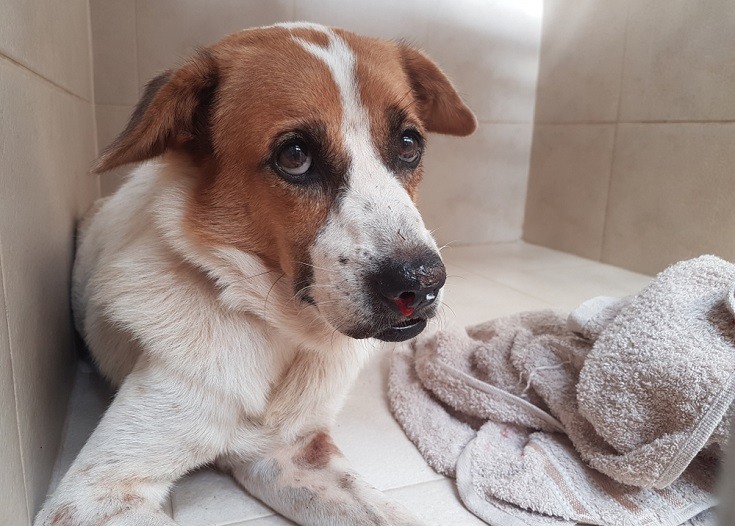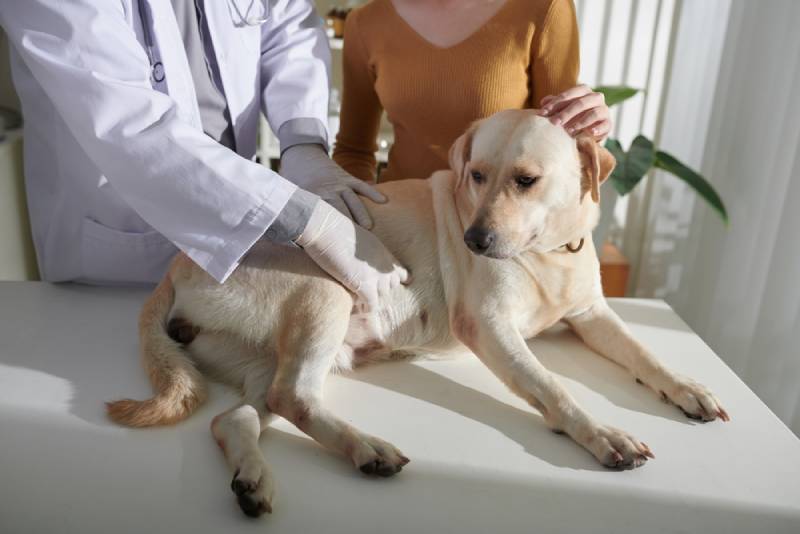Dog Bitten by a Rat? Our Vet Explains What to Do Now

Updated on
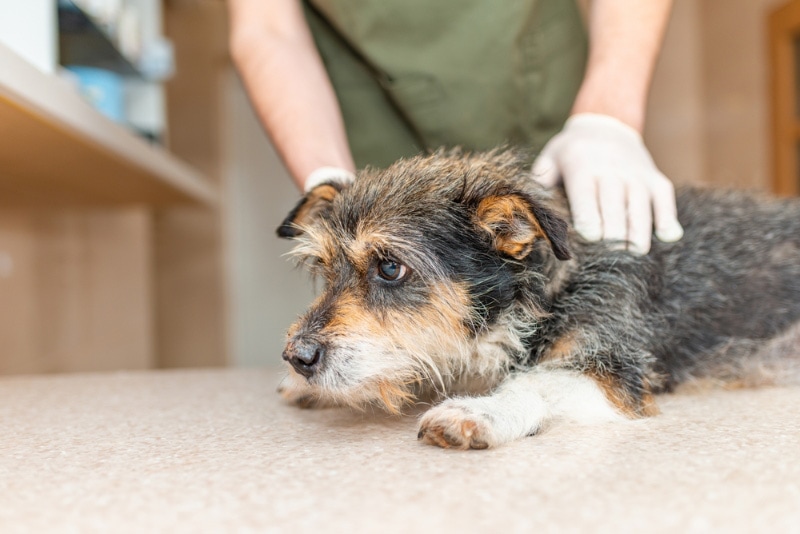
Click to Skip Ahead
Despite their small size, rats possess relatively long and sharp teeth and can be defensive and aggressive when threatened or cornered. Given that dogs and rats can share the same environment at times, a conflict between the two species could be a possibility. This leads us to the question: What should you do if your dog gets bitten by a rat?
If this does happen, there are some important safety and health factors to keep in mind. So, read on as we discuss in more detail what to do if this scenario plays out, as well as some potential medical issues to be aware of.
Steps to Take if Your Dog Gets Bitten by a Rat
1. Remain calm
Even if rats give you the heebie-jeebies, remaining level-headed and working quickly to be your dog’s best advocate in getting them care is essential.
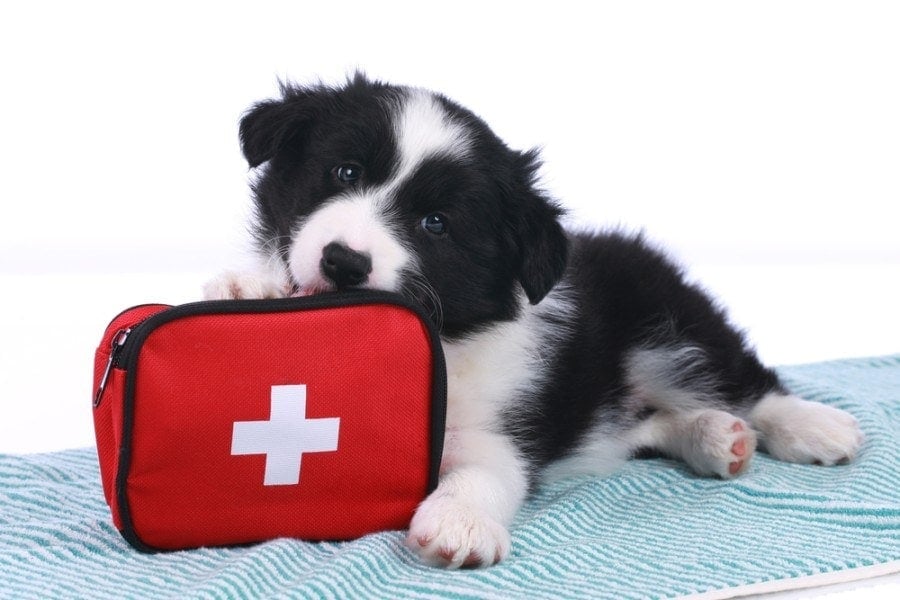
2. Restrict access and isolate
Make sure your dog, and any other animals, can be kept separate from the rat so no further interactions can take place. Not only should your dog (and you) stay away from said rat but also from their urine and fecal material until safely and properly disposed of, as these substances can also cause disease.
3. Collect information details
Did you or someone else see what happened? Where and when did the bite occur? Did your dog get ahold of or ingest some (or all) of the rat? Do you or your neighbors utilize rat bait? If so, can you get the packaging information? All this information will be helpful for step five.
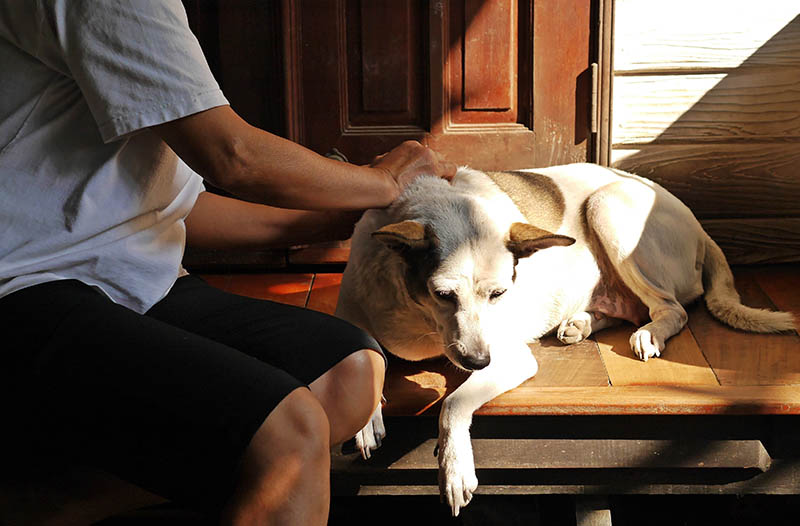
4. First aid care
While a veterinarian will want to examine the lesion promptly and prescribe appropriate care and treatment, if your dog is actively bleeding, you’ll need to apply some light pressure to help stop it. If your dog is in pain or could bite you, an e-collar or basket muzzle may help you as you transport your dog to get further care. Do not give them any medication without the direction of a veterinarian.
5. Contact your veterinarian
If they are unavailable, there are emergency clinics that may be helpful after-hours or for holidays. If you suspect rat poison may be a part of the picture, animal poison control options, such as Pet Poison Control or ASPCA Poison Control, are always open with veterinary toxicologist specialists available.

Potential Injuries and Diseases That Can Come From a Rat
If a rat bites a dog, the outcome could range from no medical complications at all to the dog getting severely ill or even dying as a result of diseases contracted from the rat. Unfortunately, there is no crystal ball that will tell you if your dog will be fine or not, and because of this, it’s important to discuss the encounter and situation with your veterinarian. A handful of the potential problems a dog could get from a rat are briefly discussed below.

1. Infection Due to Puncture Wounds
Because rats have lots of bacteria in their mouths, an untreated bite wound can become red, swollen, painful, and hot and may contain pus. Also, without exploring wounds, what seems like a superficial wound may actually have deeper tracks or take a few days to become apparent. Further complications could allow the infection to spread to the bloodstream (called sepsis), which would result in an even more severe illness.
2. Rat Bite Fever
This illness is carried and spread by wild or domesticated rats that have the bacteria Streptobacillus moniliformis or Spirillum minus. If an infected rat spreads this to a dog via close contact or a bite, the dog may or may not show signs of illness. Some signs could include fever, swollen lymph nodes, rash, and joint pain or swelling. Further complications can be infections in various internal organs or even death. The disease is zoonotic, which means that it can spread from an infected animal to people.

3. Rat Poison
Depending on the rat poison type and amount, rat poison may pose a serious hazard to your dog. Keep in mind that an affected rat will start to slow down and become weak before dying, which may make an interaction with a dog more likely. Additionally, rat poison can also be a hazard to an animal that consumes the rat that ate the poison. If rat poison is consumed, this can be an emergency that needs immediate, specific treatment based on the type of poison as well as signs seen.
4. Intestinal Parasites
If a dog ingests a rat, they can be at risk for various intestinal parasites, including zoonotic roundworms and tapeworms. These parasites can cause diarrhea, weight loss, and nutritional deficiencies. Fecal testing performed routinely, or when suspected, is helpful in diagnosis and knowing how to properly treat.

5. Leptospirosis
Rats can be common carriers of the bacteria Leptospirosis. This is most commonly spread by an infected animal’s urine, which could occur with close contact or also from contaminated soil or water in the environment. In addition, any fluid from an infected animal, even saliva, may cause the spread of the disease. Signs may be varied but often include fever, lethargy, and vomiting. If untreated, it can cause liver and kidney damage or even death.
This disease is zoonotic and can spread to people. A preventative vaccination against Leptospirosis is available and may be a good idea if your dog is at risk.
6. Tularemia
This disease is also called rabbit fever and is spread by the bacteria Francisella tularenis. While it is often found in rabbits, it can also be in rodents as well as many ectoparasites, such as ticks, fleas, etc.
Spread occurs when an infected animal or their body fluids are consumed or with contaminated water. Signs can include fever, not wanting to eat, lethargy, and enlarged lymph nodes, and treatment is with antibiotics and supportive care. This disease is also of extreme importance to people since it is zoonotic. It is also a reportable disease in the United States.

Rat Bite Treatment
Lab work and treatment for a rat bite will vary based on each individual situation. A veterinarian will attempt to examine, explore, and clean the bite/scratch wound(s) properly. It’s also likely your dog will receive antibiotics and medication for pain and inflammation.
If found to be present via lab work testing, Leptospirosis is typically treated with specific antibiotics, as well as intravenous (IV) fluids. More intensive care may be needed if the dog is very sick. Keep in mind that, until they are successfully treated, their urine could infect others.
If the dog consumed the rat, discussions about intestinal parasites, potential rodenticide poisoning, dietary indiscretion, and a foreign obstruction may be discussed, all of which would require individualized treatment specific to each scenario.
Frequently Asked Questions
1. Will My Dog Get Rabies From Being Bitten by a Rat?
The Centers for Disease Control (CDC) reports that rats and other wild small rodents, such as squirrels and mice, are “almost never found to be infected with rabies.” This means the risk of your dog getting rabies from a rat is extremely low and not a likely situation. Regardless, it would still be a good idea to discuss the situation with your dog’s veterinarian, including your dog’s rabies vaccination status, all in an attempt to keep your dog and the people around them (including you!) as safe and healthy as possible.
2. What’s My Dog’s Prognosis?
Unfortunately, this is not a one-size-fits-all situation. Many cases may just need cleansing of the wound alongside antibiotics and pain medication to be fine. With that being said, further complications, diseases, or illnesses cannot be ruled out. If a bite or encounter occurs, prompt veterinary care is recommended for the best outcome.
1. Going Forward, How Can I Prevent or Avoid Rat Exposure for My Dog?
The CDC has very valuable information regarding the control of infestations of wild rodents such as rats. In addition, a pest control company, health department, or a division of wildlife management may have great ideas or resources for help. Generally speaking, keeping food, trash, and trash cans put away and secured is helpful.
Furthermore, discussing with your veterinarian which vaccines would be best for your dog and their lifestyle and keeping said vaccinations up to date is key. Having your dog leashed in areas where rats (or other rodents) may commonly live will also help minimize the risk of an encounter.
Conclusion
Having your dog bitten by a rat may be a difficult and somewhat terrifying situation, but hopefully there is some comfort in being empowered with more knowledge on the matter. Now you know the steps to take right away, as well as potential health issues and complications to look out for and discuss with your dog’s medical provider!
You might also be interested in:
- Dog Bitten by Snake? Here’s What to Do (Vet Answer)
- Dog Bit by a Tick? Here’s What to Do (Our Vet Answers)
Featured Image Credit: ARVD73, Shutterstock






